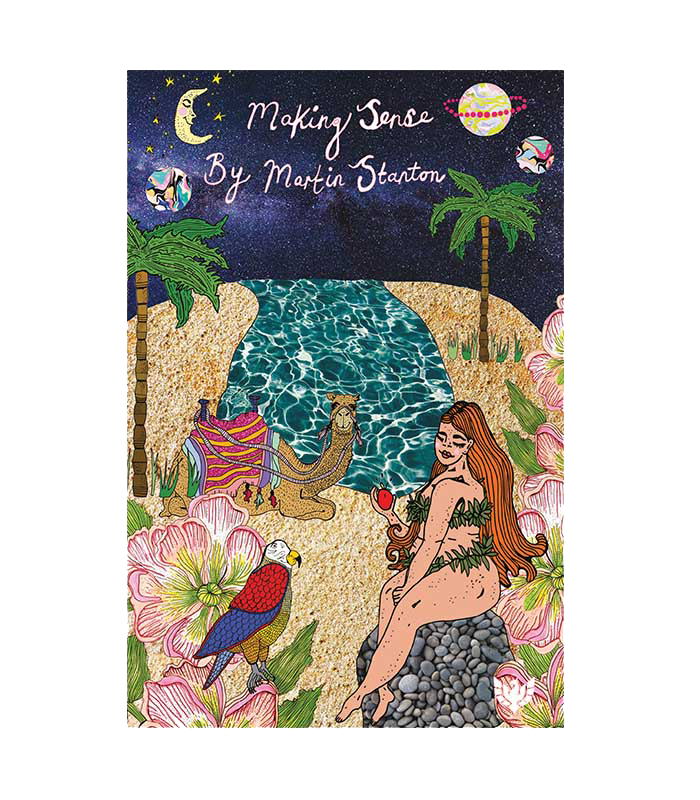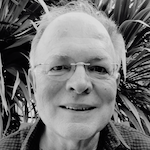A literary masterpiece from world-renowned psychoanalyst and distinguished writer, Professor Martin Stanton that picks up the baton from R. D. Laing. Spanning a novel, travel-guide, documentary, self-help book, play, photo album, film script, and work of art, Making Sense is a cultural phenomenon – a long overdue wake-up call – railing at society’s idealisation and narcissism. Martin Stanton has created a guide for a postmodern world that is constructed through social media, and communicates principally through tweets, texts and selfies.
Like Homer’s Odyssey, this is an epoch-changing classic that takes a timely quantum leap from a cognitive world of straight-line argument and causal interpretation, into a parallel unconscious universe of uncontrolled feeling, which traps fragments of fantasy in the retreating tides of reality. Making Sense collects together a group of major and minor characters, some real, some imaginary, who set out to make sense of life together by opening the social media gate between Reality and Fantasy. A survey of Martin Stanton’s own thinking and feeling on his original psychoanalytic odyssey across becalmed seas, random conversations with a therapeutic parrot, stranded for a while with Socrates on the black sandy beach of Paradise, he explores how a bezoar stone, a caddis insect, and a karaoke moment can linger through his life, and make sense for him as a primary source; as unconscious effects which sustain, enlighten, and entertain him through darker times.
This book scrawls a message of hope in the sand once the outgoing tide has retreated. ‘Enjoy life’, it says. ‘Celebrate it in yourself and in others.’




 Martin Stanton is a writer, teacher and psychoanalyst. He studied at Dartford Grammar School, St Antony’s College, Oxford, the University of Sussex, and the École Normale Supérieure in Paris. He founded the first Centre for Psychoanalytic Studies at the University of Kent in 1980. He has been a Visiting Professor at the New School for Social Research in New York City, and an Associate Research Fellow at the University of Cambridge. He founded and directed the Staff Counselling and Mediation Service at University College London in 2000, and has held senior clinical posts as a psychotherapist, counsellor, and mediator within the NHS.
Martin Stanton is a writer, teacher and psychoanalyst. He studied at Dartford Grammar School, St Antony’s College, Oxford, the University of Sussex, and the École Normale Supérieure in Paris. He founded the first Centre for Psychoanalytic Studies at the University of Kent in 1980. He has been a Visiting Professor at the New School for Social Research in New York City, and an Associate Research Fellow at the University of Cambridge. He founded and directed the Staff Counselling and Mediation Service at University College London in 2000, and has held senior clinical posts as a psychotherapist, counsellor, and mediator within the NHS.
Kevin Jones, Head of Department, Social, Therapeutic and Community Studies, Goldsmiths, University of London –
Are we being taken for a ride? Certainly. Martin Stanton audaciously unzips and spills the traditions of radical psychoanalytic thought into the contemporary moment, unleashing lines of flight into the vital forces of art, dream, imagination, and wit. This book will be an inspiration for all those who feel dismay at their role in a society that is increasingly out of order. Caught as we are on the narrow rails of the neoliberal rollercoaster, where science and reason are applied as the desperate brakes on the psychosocial ravages of economic individualism and ruling class power, this book switches the tracks. It unfetters the liberatory vision of a therapeutic education that acknowledges the beauty and terrors of a search for freedom beating at the heart of the therapeutic enterprise. Whether looking at Facebook or works of art as bearers of a benign gaze or as a trap, this vital book challenges all professional talking heads to stop making sense and to start sense making in our practice.
Attila Bánfalvi, Head of Department of Humanities for Health Care, Institute of Behavioural Sciences, University of Debrecen –
Martin Stanton’s long-awaited new book Making Sense will enter the mental field in a cultural atmosphere where almost all the basic issues of the so-called psy-complex have been questioned during the last decades. We cannot be sure whether there are mental illnesses at all in the medical sense; whether these hardly existing disorders are treatable via biomedical technologies especially drugs; whether psychotherapies run parallel with drugs in the sense that they can provide pill-substitute techniques for changing the unneeded aspects of the psyche; whether psychological knowledge can be scientifically valid (quantitive, measurable, universal, repeatable).
Stanton has the huge merit of re-introducing the works and ideas of Sándor Ferenczi, who in the first half of the twentieth century drew the conclusion from his psychoanalytic experiences that all ‘techniques’ should be given up in the process of dealing with the existential problems of human beings. I am sure that Stanton takes this position very seriously and is breaking radical new ground in this book. On this philosophical basis, Making Sense can only be thought-provoking, by way of giving up any established, conventional method: no ultimate meaning in life, therefore an ultimate method is impossible, leaving in its place floating, ever-changing ones. The creative perspective towards psychic pain, and driving towards new meanings from it, makes Martin Stanton’s work deeply inspiring and intellectually challenging reading.
Axel Hoffer, MD, Training and Supervising Analyst, Boston Psychoanalytic Society and Institute and former Associate Professor of Psychiatry, Harvard Medical School –
Martin Stanton is an internationally known and respected author, teacher, and researcher in the field of psychoanalysis. An early contribution led to a first prototype Centre for Psychoanalytic Studies at the University of Kent in Canterbury, UK, in 1986. His book, Sándor Ferenczi: Reconsidering Active Intervention (Aronson/Free Association, 1991) created a Ferenczi renaissance which brought Ferenczi’s contributions into international recognition which continues to this day.
Stanton is a highly original and creative author. This book, Making Sense, continues Stanton’s critique of psychoanalytic conventional thinking. He questions the accepted analytic technique of ‘interpretation’ as relying on a basic misunderstanding of life. He criticises the cognitive approaches to treatment as rigid and wrong-headed. Stanton emphasises the important place of feelings over thinking. His thinking is based on Freud’s original definition of the fundamental rule of psychoanalysis: ‘free association’. His expansive and highly original thinking is based on his recognising the lack of an ‘ultimate meaning in life’. This gives him the freedom and the space to go beyond the inherent limitations of society’s (and analytic) ways of viewing life. His book will provide important insights not only for psychoanalysis but also into our experience of living. With his fine international reputation, Martin Stanton’s new book Making Sense will receive widespread acclaim. I am happy to recommend his new book to you and I, personally and as a psychoanalyst, look forward to reading it.
Professor Judith E. Vida, MD, former Clinical Associate Professor of Psychiatry, Los Angeles County-USC School of Medicine and former President, International Forum for Psychoanalytic Education –
Martin Stanton was a pioneering instigator in the arduous travail of Sándor Ferenczi’s return from ostracism for alleged psychoanalytic heresy. In the decades since, joined by other intrepid scholars to present what Ferenczi actually did, said, and wrote, he has absorbed both the essence and the process of Ferenczi’s unique creativity and humanism too long banished from psychoanalytic discourse and practice. Making Sense is the welcome demonstration of that absorption: a radical proposal that the real-life complexity of thought, emotion, and experience will always resist closure, resolution, fixing, getting over it, interpretation, diagnosis, and so-called ‘normality’. In so doing, Stanton generates poetic new metaphors for living that are as supportive as they are expansive. For Sándor Ferenczi, nothing was ever filed away as finally dealt with, a worldview Martin Stanton now honors with these morsels of practical wisdom, each at once juicy, sweet, and savoury – and full of new nourishment.
Joanne Owen, review from lovereading.co.uk –
“Curiouser and curiouser”, as Alice remarked during her Wonderland sojourn, a description that might also be applied to this genre-melding book. It’s a creative collision of genre and style (fiction, travel writing, self-help thinking and script), steeped in R. D. Laing’s theories, and underpinned by the view that life cannot be understood or explained in a linear fashion. It opens by drawing an analogy between a rollercoaster ride and “the way we use technology to make sense of the open-endedness, instability, and unpredictability of our life”. The author seeks to “provide whatever helps us make sense on every section of the ride,” doing what he can “to provoke us to (re)think and (re)locate exactly where we stand when faced with such uncontrollable rollercoaster feelings.”
Referencing art, theatre, history and poetry, and (for one example) describing how physical interactions with nature intersect with digital counterparts (such as checking Trip Advisor and maps), this passionately descriptive, personal work organically leaps, jolts and careers in a manner somewhat reminiscent of a surrealist manifesto. There’s a strong thread on the dissonance between one’s real and constructed digital self: “All my waking hours, I wander around the Internet. I am constantly online on every social network. I never reveal a social status, and I never tick a ‘like’ box, unless someone says something flattering about me…My photos are always carefully posed.” And yet, “I am totally terrified. I do not know who I am behind this carefully lacquered artifice.”
Like the human mind and the modern world, this book has its own curious logic and will be an exhilarating experience for readers interested in psychoanalysis, especially those seeking insight into navigating the jungle of contemporary communications.
Helen Lowe, psychodynamic counsellor, ‘Healthcare Counselling and Psychotherapy Journal’ © BACP, 2020 –
“There are echoes of the psychiatrist RD Laing’s understanding of the distressed mind as loaded with symbols that are rich and meaningful to the individual. They are therefore helpful and should not be medicated away or ignored.
The author explores the way we use technology to mediate our interactions with our emotional worlds. The theme of ’not knowing’ also runs through the book and is, in fact, a challenge for the reader.
There are imaginative and surreal evocations of the mind … Such descriptions … are loaded with rich metaphors for both the client and the therapist, as they grapple to understand the ‘entire span’ of a life history…
The book is so densely imaginative …that it is a challenge to follow at times…
…It’s a wild rollercoaster ride, difficult to describe and stay with, but with some astonishing images along the way. Perhaps like our minds.”
Kevin Jones in ATOL: Art Therapy OnLine, 12(1) –
“an inspiration for all those who feel dismay at their role in a society that is increasingly out of order.” Read the full review here.